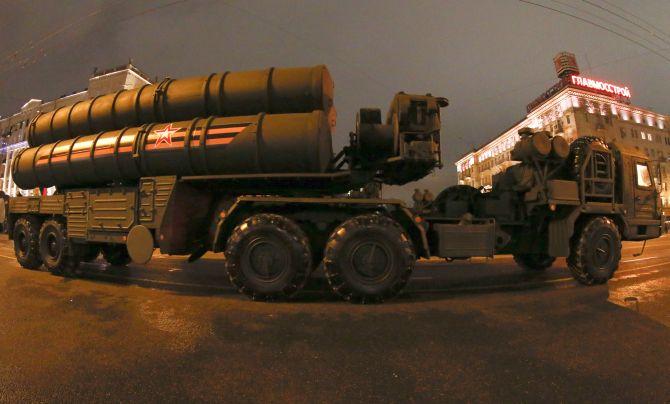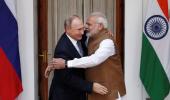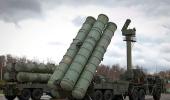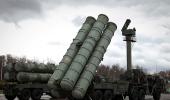Russia has already begun delivery of the first S-400 systems, and the question of sanctions, or of a waiver to sanctions, preoccupies New Delhi, reports Ajai Shukla.

On Tuesday, the US State Department said that although the US has sanctioned Russia over the last four weeks, including the imposition of defence sanctions, the Biden administration is not about to sanction India anytime soon for buying S-400 air defence missile systems from Russia.
At a media briefing in Washington, DC, US State Department Spokesperson Ned Price also said that India's strong dependency on Russian arms was the outcome of an era in which Washington, and some of its partner countries, were unwilling to have defence and security ties with New Delhi.
New Delhi is concerned that its impending purchase of five units of S-400 Russian long range missile systems could bring down American sanctions on India under the Countering America's Adversaries Through Sanctions Act (CAATSA) -- a US federal law that mandates sanctions against countries that engage in 'significant transactions' with Russian, Iranian and North Korean defence and intelligence entities.
On Tuesday, Price downplayed the probability of whether CAATSA sanctions would be triggered by India's purchase of the S-400 missile system. 'I don't have anything new to update you on when it comes to the applicability of CAATSA. We continue to work with Congress and our Indian partners on these issues.'
The US Congress has empowered American presidents to waive sanctions where required, but the US administration says waivers would be given only in exceptional cases. New Delhi has argued that, given China's occupation of Indian territory on the Ladakh-Tibet border and the People's Liberation Army's aggressive confrontation with Indian troops, Washington should grant India an early waiver from CAATSA.
Russia has already begun delivery of the first S-400 systems, and the question of sanctions, or of a waiver to sanctions, preoccupies New Delhi.
New Delhi has argued that India has little choice but to source weapons and defence equipment from Russia, given the historical arms supply partnership between the two countries.
The State Department spokesperson pointed out that the historical dimension of India's arms relationship with Russia had been acknowledged recently by top level US officials, including Under Secretary of State for Political Affairs Victoria Nuland.
Nuland said, on her visit to India this week, that New Delhi's close defence and security relationship with Moscow had come together decades back, at a time when neither the US, nor some of its security partners, were prepared to have that kind of relationship with India. 'It was a very different time, different considerations, but those times have changed,' Price said, quoting Nuland.
'They've changed in terms of our willingness and ability to be a strong defence and security partner of India. This is a bilateral relationship that has deepened in a number of ways over the past 25 years or so,' said Price.
'We are a partner of India when it comes to shared interests, when it comes to the values we share in a free and open Indo-Pacific,' Price said. 'And we've invested in that relationship in terms of our defence and security. So historical relationships notwithstanding, we are a partner of choice for India now, as are many of our partners and allies around the world.'
Addressing India's growing importance in the Indo-Pacific security architecture and the Quadrilateral Grouping (Quad), Price stated: 'We know that India is an essential partner for us in realizing our shared vision of a free and open Indo-Pacific. That is really at the heart of the Quad's goals.'
Responding to a question about why 'the largest democracy in the world is, in fact, buying Russian oil right now at a discount -- expanding its purchases and taking advantage of the situation', the US administration responded: 'What we would project or convey to any leader around the world is that the world -- the rest of the world is watching where you are going to stand as it relates to this conflict, whether its support for Russia in any form as they are illegally invading Ukraine.'











 © 2025
© 2025